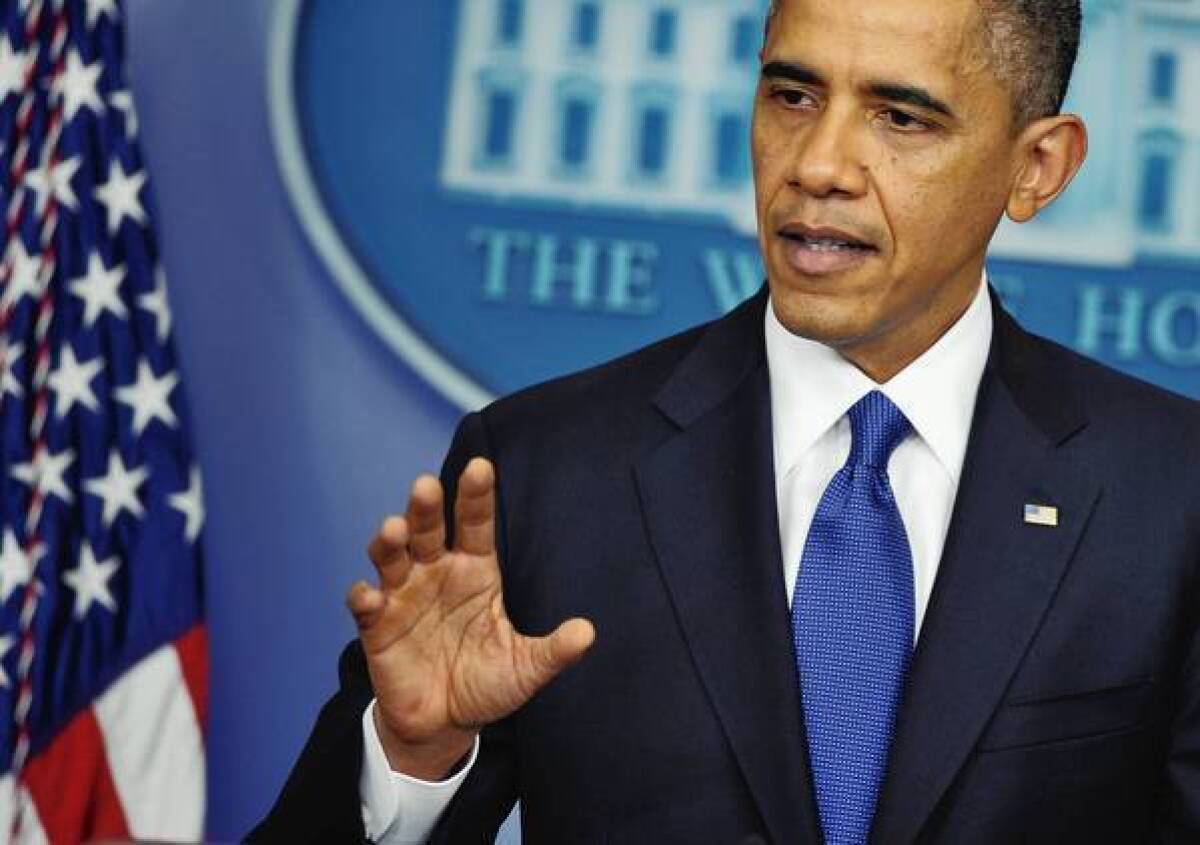Obama offers scaled-back plan to limit tax increases

- Share via
WASHINGTON — With the sudden collapse of House Speaker John A. Boehner’s Plan B to avert most year-end tax increases, President Obama and congressional leaders face a daunting choice: compromise in the few days remaining before tax hikes and spending cuts kick in, or call it quits and soar off the “fiscal cliff.”
Obama appeared in the White House briefing room late Friday to urge congressional leaders to at least prevent income tax increases on household income of less than $250,000, continue long-term unemployment benefits and delay the mandatory spending cuts set to begin in January.
“Call me a hopeless optimist, but I actually still think we can get it done,” Obama said before leaving with his family to spend Christmas in Hawaii.
The president’s plea was a retreat from the much broader deal he had sought during private talks with Boehner, which fell apart this week as the Ohio Republican pursued a separate course. By suggesting last-ditch action on priorities that are most important to Democrats, Obama is not likely to attract an enthusiastic GOP response.
Obama talked with Boehner by telephone before he spoke in the briefing room, and he met at the White House with Senate Majority Leader Harry Reid (D-Nev.) — a trusted partner who could help craft a deal in the Senate. All sides expect to return to Washington next week.
“Everybody can cool off; everybody can drink some eggnog, have some Christmas cookies, sing some Christmas carols, enjoy the company of loved ones,” the president said. “Think about the obligations we have to the people who sent us here.”
Even this more modest request will probably run into opposition from Republicans as they weigh whether to seek a better agreement or stomach the tax hikes that will happen Jan. 1 if nothing is done.
The options carry political and practical calculations for all sides — and could determine not only whether every American sees a bigger tax bill, but also whether Obama’s second term will be consumed by more chaotic budget debates.
Although Boehner’s stature appears diminished by his failure to persuade GOP colleagues to support his tax plan — which would have raised taxes on incomes over $1 million — Republican support, or at least acquiescence, will be required for congressional action.
That includes Mitch McConnell of Kentucky, the Senate minority leader. Obama will face continued pressure to sweeten his budget plan so McConnell does not put up a filibuster fight.
McConnell is a close-to-the-vest operator eyeing his own run for reelection in two years. If a budget deal cleared the Senate, that would put pressure on Boehner to bring it to a vote — even if most of his Republican colleagues opposed it — and allow it to pass with Democratic support. That would threaten his authority as speaker, which stems, in part, from controlling what legislation comes to the House floor.
Boehner dealt himself a blow — and strengthened the Democrats’ hand — with his Plan B, which conservatives rejected as a tax increase. The proposal would have kept most tax rates the same but allowed the scheduled increase on incomes above $1 million to take effect. The rate would have risen to 39.6% from 35%.
Despite the setback, Boehner reasserted himself Friday, accompanied by his sometime-rival, House Majority Leader Eric Cantor of Virginia, in a public display of solidarity.
As for a deal, the speaker said, “How we get there, God only knows.”
Obama must decide whether he is willing to make concessions to Republicans to achieve a broader budget deal. Many Republicans have signaled publicly, and privately, that they are willing to raise taxes as part of a deal to cut spending.
In negotiations with Boehner, Obama proposed raising taxes only on household income above $400,000 and cutting the inflation adjustment for Social Security and other government benefits.
The president had campaigned for reelection on keeping tax rates the same for the first $250,000 of income for families and $200,000 for individuals, but raising rates on income above that level. He returned to that stance Friday, when he made a pitch to Republicans to help enact a few stopgap measures. His party’s left flank is unlikely to cheer another overture to the GOP.
“The slate is clean,” AFL-CIO President Richard Trumka said in a statement. Obama has “no obligation to radical Republicans,” he said.
All parties were weighing whether a deal remained within reach or whether the fiscal cliff would provide strengthened leverage to fight what Boehner has called “trench warfare” into next year.
In a matter of months, a vote will be needed to raise the debt limit so the nation can pay its bills. That has the potential to create a replay of the 2011 battle that led to the current standoff. A new bill to keep the federal government functioning will also be due in the spring.
“Both sides need to recognize what the other can do,” said David Winston, a longtime GOP strategist who is close to the House leadership. “Republicans and Democrats, the last thing they want to do is go off the fiscal cliff.”
Michael A. Memoli in the Washington bureau contributed to this report.
More to Read
Sign up for Essential California
The most important California stories and recommendations in your inbox every morning.
You may occasionally receive promotional content from the Los Angeles Times.















